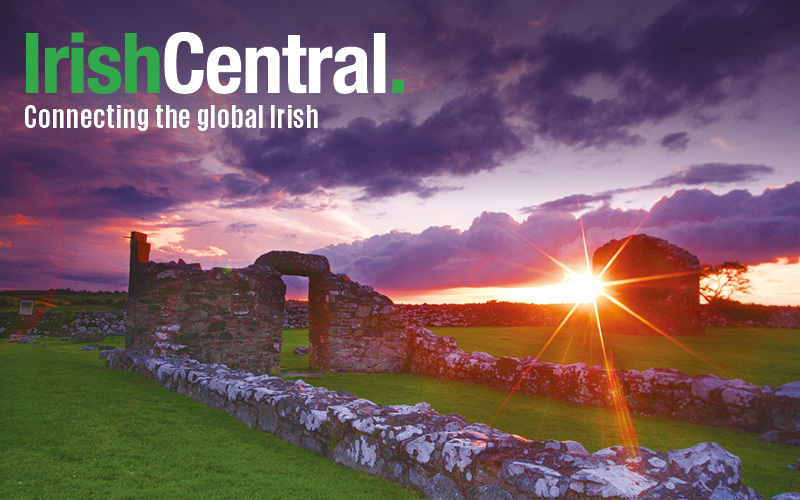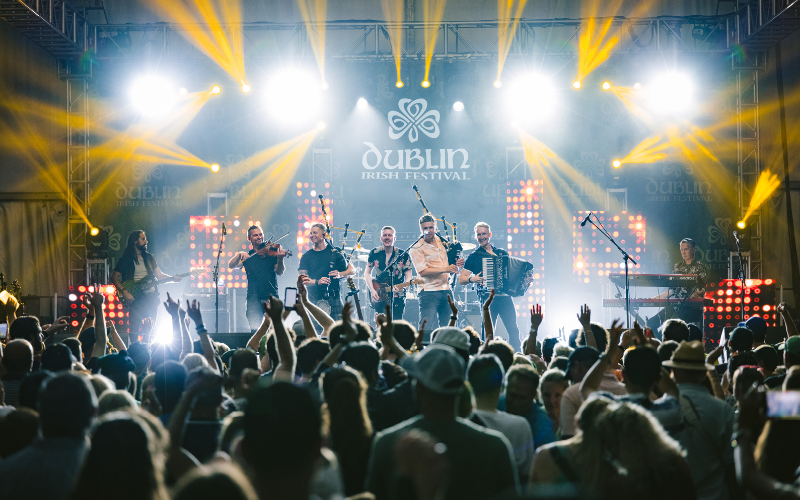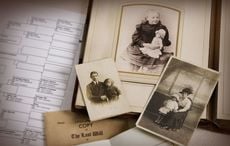My great-grandfather George Gorman struck a policeman with a meat cleaver from the family’s butcher shop. He fled Ireland and arrived in New York City during the blizzard of 1888.
That’s what we were told.
My family proudly hung onto that story. “Ol’ George didn’t take guff from no one,” we’d say of our ancestral tough-guy-designee. Curious, I spent hours poring through old newspapers and corresponding with researchers, not finding any mention of the event.
I began to think I’d never learn the truth, but I continued the search, often wondering, “What’s driving me?”
I learned that the Gormans did in fact own a butcher's shop, as well as an eighteen-acre farm in Castleblayney, County Monaghan in the late nineteenth and early twentieth centuries. I also found a number of old photos of Castleblayney that were taken on Main Street, where the family shop was located. It was a start. I planned a visit to Ireland to see what I could learn.
After arriving in Dublin my family and I drove to Castleblayney, a bustling little market town about fifty miles north. Chatting up folks in the shops that line Main Street, I soon learned of an older gentleman whom many considered the town’s unofficial historian, Jackie Byrnes. I was directed to Jackie’s home at the end of Main Street where Jackie, a retired tailor and octogenarian, cheerfully greeted my mother, my wife and son, and me. I told Jackie I was looking for information on an old family member. “Yes, yes, aren’t they all?” he asked. “Come in. Come in. Have a cup of tea.”
I recited the “butcher shop” story and shared some old photos of Castleblayney, but Jackie said he’d never heard of any such incident. “No one older than me in this town, so if I don’t know the story, no one does. I’m sorry I don’t know the man you speak of. He left before I was born.” Then he smiled and said, “Ah, but I knew the family. I grew up on the property next to the Gormans. You’d like to see the farm now, wouldn’t you? It’s about a mile from town. We’ll drive out there.“
My family, Jackie and I got in the car and drove down Main Street. “Stop here and look at your photo,” Jackie said. He pointed to the last awning in the photo, on the right side of the street. “I think that was your family’s shop.” We sat and stared at our first link to the past. Was this where the incident occurred?
We drove just outside of town and I pulled the car onto the dirt road entrance to the farm. “We can get out and walk around a bit, but not for long. The gardaí won’t be too happy to find us here,” Jackie said of the local police. We walked about one hundred feet up the road; the farmhouse came into view. The unoccupied house, made of stone, brick and cement was in disrepair. We entered the main room, which was piled with paint cans, oil drums and buckets. An old wooden mantle surrounded the bricked-up fireplace, which was used for cooking years ago. A door led into another room where stairs–they looked unsteady–led to the second floor. I didn’t chance the climb.
I returned to the room that was used for cooking and eating. My mother was standing in front of the fireplace, imagining a scene scripted over a century ago. “This is where they would sit and eat every night,” she said. I could feel the surge of emotion in her voice as she stood silently staring. And although she didn’t express it as such, my mother appeared to be on a pilgrimage and was, at last, standing in front of a family shrine.
I waited, not knowing what she was feeling, as she gathered her emotions.
“It’s the first time I’ve ever felt my father was connected to something,” she said. “His childhood on the streets of New York was filled with misery, there was the fire when he was six years old, which killed his younger brother and scarred him, and he lost his mother from tuberculosis when he was four. It always seemed as if nothing or no one came before him. And it’s the first time I’ve ever felt warmth for my grandfather George. No one ever had anything nice to say about him, but now his reason for coming to America doesn’t seem so important. I really don’t know why I feel better,” she said. “Maybe it’s knowing there really is a link, a connection between my father, my grandfather, and Ireland.”
After a few minutes, Jackie suggested that it would be wise to leave. We drove Jackie back to his home and thanked him for all he’d done. We left Castleblayney and returned to Dublin.
We never learned why my great grandfather left Ireland. I sifted through police records, old newspapers and reams of microfilm, but found nothing. I now believe the “butcher's shop” story was a blend of fact and fiction. Perhaps George, a disputatious character, got into a scuffle with the police, left Ireland, and then embellished the story, adding a touch of bravado to boost his own self-worth. Or maybe it was my grandfather Allie who reworked his father’s story into a myth for his own purposes. Fights, hardship and struggle dominated Allie’s adolescence; perhaps he reinterpreted his father’s story to help him survive his own childhood.
Now, these many years later, I think of my mother standing in front of the fireplace in communion with her father, grandfather and those who came before them, the expressiveness of her silence more powerful than any words I can write or speak.
In that singular moment, in my mother’s silence, the reasons for George’s departure, while interesting, no longer seemed useful. The story that my family turned into a wild tale of struggle and survival—“them against us”—had evolved. That moment with my mother revealed the answer to my question, “What’s driving me?” It was the search for that most basic of human needs—connection. I dug no further.
---
Charles R. Hale was born, raised and educated in New York. He is a former partner of a NYC based consulting firm Hale, Borenstein Ltd. Charles, along with Niamh Hyland, is a cofounder of Artists Without Walls, an organization purposed to inspire, uplift and unite people and communities of diverse cultures through the pursuit of artistic achievement. His film “Walls: We Are Not Forgotten,” about the life of singer Judy Collins, was presented at the 2012 Eugene O’Neill Award ceremony honoring Ms. Collins. In 2013 the City University of New York honored Charles for ”Outstanding Service to New York and Irish America.”




Comments